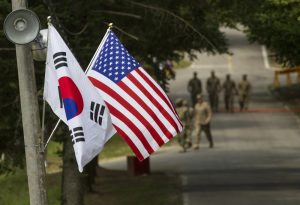After four years of being in the White House’s crosshairs on a range of security and economic issues, it was hardly surprising – if not poetic – that South Korean President Moon Jae-in openly embraced U.S. President Joe Biden’s inauguration by tweeting “America is back.” Since then, the White House has given Seoul every reason to believe this claim is true, including an agreement in principle to a new military burden-sharing agreement and an upcoming official visit by U.S. Secretary of State Antony Blinken and U.S. Secretary of Defense Lloyd Austin. While these positive developments and the overall tone of cooperation are a marked reversal from the previous administration, the much more difficult work is still ahead.
In many ways the Trump administration set a low bar for Biden as an ally in Seoul. Trump frequently criticized South Korea as a “free rider” that was both not contributing enough for U.S. troops based there and exploiting the U.S. economy through trade. After openly criticizing Seoul for not paying more for the deployment of the THAAD missile defense battery in 2017 and suggesting he would be open to drawing down U.S. military forces in South Korea over cost concerns in early 2018, Trump unilaterally decided to suspend combined military exercises during the Singapore summit with North Korean leader Kim Jong Un in June 2018, similarly citing their price.
This transactional approach loomed over the relationship, exacerbated by the military burden-sharing negotiations known as the Special Measures Agreement (SMA). When the ninth SMA was set to expire at the end of 2018, Washington asked for between a 50 percent and 100 percent increase in Seoul’s contribution – the average increase for each previous agreement since 1991 had been around 8.5 percent. The two sides eventually settled on an 8.2 percent increase in February 2019, just before Trump-Kim summit in Hanoi, but only for one year – the previous two agreements had shelf lives of five years. When it came time to negotiate a new agreement just a few months later, the United States’ opening ask was reportedly a 400 percent increase from South Korea. By the time Trump left office, more than a year since the previous one had expired, no agreement had been reached on a new SMA.
Considering all of the troubles U.S.-South Korea ties faced from the White House in the past four years it may be hard to remember now, but the early days of the Trump administration showed some initial promise as well. After questioning the U.S. alliance commitment to South Korea on the campaign trail, Trump stepped back his previous comments in a phone call to then-South Korean President Park Geun-hye just one day after being elected. Seoul also quickly hosted a steady stream of senior U.S. officials, including Defense Secretary Jim Mattis, Secretary of State Rex Tillerson, Vice President Mike Pence, and CIA Director Mike Pompeo (later to become secretary of state).
However, the key difference between now and 2017 appears to be a coordinated approach between the top and lower levels of government that is helping to amplify cooperative action. The disjointed, purposefully “disruptive” style that marked the Trump administration, by contrast, intensified tensions. Moon was one of Biden’s first reported calls to a foreign leader as president-elect, during which the two leaders stressed the importance of the alliance, working closely on the North Korea nuclear issue, as well as other issues such as global health and climate change. Biden’s picks for key positions – which in addition to Blinken and Austin include Jake Sullivan as national security advisor and Kurt Campbell in the newly created Indo-Pacific coordinator role – were all seen as promising for advancing bilateral ties. On areas of critical significance for Seoul, Washington has been sending clear, unified messaging on the importance of close ties, with tangible follow-through in the form of new measures such as a review of North Korea policy, the long-awaited resolution to SMA negotiations, and the upcoming 2+2 dialogue.
While this new turn is certainly in the right direction and its significance should not be understated, it is so far only bringing the alliance back to where it should have been under Trump rather than tackling stubborn preexisting issues and tricky new areas in the alliance.
Ties between Seoul and Tokyo worsened under Trump over historical issues, namely 2018 court rulings in South Korea that determined Koreans forced into working for Japanese steel companies during World War II were owed compensation, in turn prompting Japan to tighten export controls on components crucial to South Korea’s semiconductor industry. As deputy secretary of state in the Obama administration, Blinken was a major driving force behind the U.S. attempt to strengthen ties between Tokyo and Seoul, but helping the two reconcile may prove harder now given recent events.
Additionally, even though Biden looks to have a less confrontational approach toward China across the board, Seoul is still going to view Beijing as less of a threat than Washington does. This will likely pose a challenge across a range of issues, such as decoupling supply chains for technologies with national security implications, which is already being examined and could call for South Korea’s participation as well. Further, despite a push for close coordination on North Korea, practically speaking Biden and Moon may not quite see eye to eye on the tenor of engagement with North Korea.
It is still very early days for the Biden White House and there is plenty of time to work through the more complicated challenges ahead, but they are going to take more active diplomacy than the efforts so far intended to reassure Seoul of Washington’s commitment to the alliance.

































